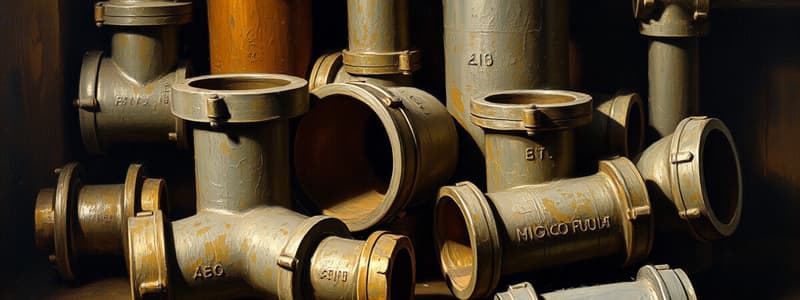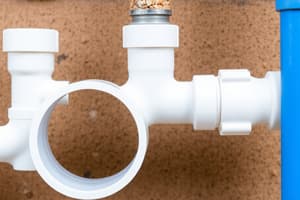Podcast
Questions and Answers
What is the main function of gate valves in plumbing systems?
What is the main function of gate valves in plumbing systems?
- To allow full or no water flow (correct)
- To maintain a specific water pressure
- To regulate water flow continuously
- To provide a visual indication of water status
Why are gate valves not recommended for controlling the volume of flow?
Why are gate valves not recommended for controlling the volume of flow?
- They require constant maintenance.
- They are more expensive than other valves.
- They can become permanently stuck. (correct)
- They tend to leak when partially open.
Which type of valve is most commonly used for main water shutoffs?
Which type of valve is most commonly used for main water shutoffs?
- Compression valve
- Ball valve (correct)
- Globe valve
- Butterfly valve
How does a ball valve indicate whether it is open or closed?
How does a ball valve indicate whether it is open or closed?
In what scenario are globe valves typically used?
In what scenario are globe valves typically used?
What unique feature distinguishes globe valves from other types of valves?
What unique feature distinguishes globe valves from other types of valves?
What is a common disadvantage of gate valves?
What is a common disadvantage of gate valves?
What distinct internal component allows a globe valve to regulate water flow?
What distinct internal component allows a globe valve to regulate water flow?
What is the primary function of a butterfly valve?
What is the primary function of a butterfly valve?
What maintenance issue is commonly associated with butterfly valves?
What maintenance issue is commonly associated with butterfly valves?
Which type of valve is specifically designed to allow water to flow in only one direction?
Which type of valve is specifically designed to allow water to flow in only one direction?
What is a characteristic feature of fixture shutoff valves?
What is a characteristic feature of fixture shutoff valves?
What is a common application of pressure-reducing valves in plumbing systems?
What is a common application of pressure-reducing valves in plumbing systems?
Which statement about check valves is correct?
Which statement about check valves is correct?
What feature distinguishes a ball valve from a butterfly valve?
What feature distinguishes a ball valve from a butterfly valve?
Which valve type is most likely found in lawn sprinkler systems to prevent back-flow?
Which valve type is most likely found in lawn sprinkler systems to prevent back-flow?
What is the primary function of pipe fittings?
What is the primary function of pipe fittings?
Which type of reducer is described as having a cone shape?
Which type of reducer is described as having a cone shape?
What is a characteristic unique to compression fittings?
What is a characteristic unique to compression fittings?
In a plumbing system, what is the function of a valve?
In a plumbing system, what is the function of a valve?
Which type of joint involves a nut, male end, and female end?
Which type of joint involves a nut, male end, and female end?
What do eccentric reducers prevent in plumbing systems?
What do eccentric reducers prevent in plumbing systems?
Which material is NOT commonly used in the construction of valves?
Which material is NOT commonly used in the construction of valves?
What type of valve is most commonly used in plumbing applications?
What type of valve is most commonly used in plumbing applications?
Flashcards
Pipe Fittings
Pipe Fittings
Direct changes in pipe routing, adapt sizes, and connect branches.
Common Pipe Fittings
Common Pipe Fittings
Elbows, reducers, tee connections, caps, and crosses.
Compression Fittings
Compression Fittings
Use rubber seals or gaskets to prevent leaks.
Slip Couplings
Slip Couplings
Signup and view all the flashcards
Closed Nipple
Closed Nipple
Signup and view all the flashcards
Concentric Reducers
Concentric Reducers
Signup and view all the flashcards
Eccentric Reducers
Eccentric Reducers
Signup and view all the flashcards
Couplings
Couplings
Signup and view all the flashcards
Unions
Unions
Signup and view all the flashcards
Valves
Valves
Signup and view all the flashcards
Gate Valve
Gate Valve
Signup and view all the flashcards
Ball Valve
Ball Valve
Signup and view all the flashcards
Globe Valve
Globe Valve
Signup and view all the flashcards
Butterfly Valve
Butterfly Valve
Signup and view all the flashcards
Check Valve
Check Valve
Signup and view all the flashcards
Fixture Shutoff Valve (Stop Valve)
Fixture Shutoff Valve (Stop Valve)
Signup and view all the flashcards
Pressure-Reducing Valve
Pressure-Reducing Valve
Signup and view all the flashcards
Study Notes
Pipe Fittings
- Pipe fittings direct changes in pipe routing, adapt sizes, and connect branches.
- Common types include elbows, reducers, tee connections, caps, and crosses.
- Fittings cater to specific layout and process needs, and are sold separately from pipes.
- End connections used for fittings can be welded, soldered, or glued.
- Adaptors work with PVC and copper piping.
- Compression fittings utilize rubber seals or gaskets to prevent leaks.
- Slip couplings allow for length adjustment and repair by sliding over damaged sections.
- Double tapped bushings are fixed reducers; closed nipples have continuous threading, typically male.
- Concentric reducers are cone-shaped; eccentric reducers resemble bell shapes reducing air bubbles.
- Couplings are permanent and require cutting out for removal.
- Unions consist of a nut, male, and female ends for easy assembly and disassembly.
Valves
- Valves regulate or stop water flow; each type has specific applications and advantages.
- Materials for valves include bronze, brass, and PVC plastic, selected based on pipe material.
Gate Valve
- Commonly used for shutoff purposes, gate valves raise/lower an internal gate to control flow.
- Designed for full-opening or full-closing; not for flow regulation.
- Reliable for infrequent shutoff; susceptible to corrosion, which may cause sticking.
Ball Valve
- Reliable for main and branch water shutoffs, serves as an all-or-nothing valve.
- Operated via a handle; when parallel to the pipe, the valve is open, and closed when perpendicular.
- Offers a clear visual indication of water flow status.
Globe Valve
- Used predominantly for regulating water flow; characterized by its bulging body.
- Features a twist knob for operation; allows for precise flow control.
- Effective for applications needing regular adjustments, such as outdoor faucets.
Butterfly Valve
- Similar to ball valves in appearance but uses a rotating metal disc for flow regulation.
- Capable of fine-tuning flow volume, unlike ball valves which are strictly ON-OFF.
- Commonly used in industrial applications; may require maintenance due to internal gaskets.
Check Valve
- Prevents backflow by allowing water to flow in one direction only.
- Commonly seen in outdoor faucet installations; some variants are operational stop-checks.
Fixture Shutoff Valve (Stop Valve)
- Small valves control flow to individual fixtures like faucets and toilets.
- Available in straight or angled versions; simplify maintenance without turning off the main supply.
- Operates via different internal mechanisms, including compression washers and diaphragm designs.
Pressure-Reducing Valve
- Installed to manage water pressure within plumbing systems, ensuring it remains within acceptable limits.
- Typically comprises a spring and diaphragm that can be adjusted according to water supply pressure.
Studying That Suits You
Use AI to generate personalized quizzes and flashcards to suit your learning preferences.




